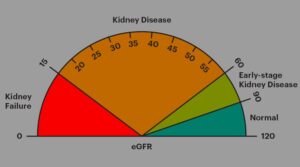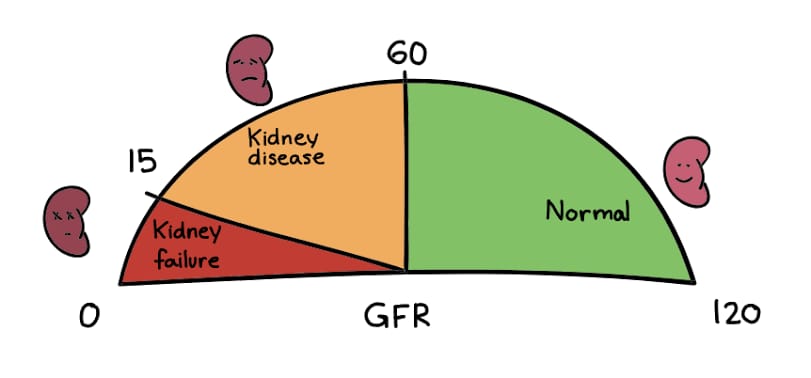If you are the one who has this question in your mind – “Can My eGFR Get Better” then the best way you can get the answer to this question is to ask your nephrologist whether you have AKI or CKD. There could be a possibility that a man can have both these conditions.
Learn more about “AKI and CKD”.
What is the estimated glomerular filtration rate (eGFR)?
Your kidneys are your body’s filter as they remove wastes, toxins, and excess water from the body through urine. To know whether your kidneys are performing efficiently and filtering the blood well, the parameter nephrologists look for is your estimated glomerular filtration rate (eGFR). GFR is calculated by a mathematical formula that is obtained based on creatinine levels, age, and gender
Creatinine levels are obtained by analyzing your blood sample.
Normal GFR can vary between 60-100ml/mt depending on your age and gender

As you grow older your eGFR number tends to go down which is a natural phenomenon. There will be a 1% decline in your GFR every year after the age of 40yrs.
The higher the GFR number, the better – but the value of eGFR lower than 60 indicates that something is wrong with your kidneys or they may not be working properly.
Learn more about kidney disease and GFR
As far as your eGFR number is concerned, this is important for you:
There could be a possibility of slight variations (up and down in numbers) in values or numbers between tests. This is normal. Therefore, in order to understand your eGFR numbers better, you should look at the general pattern over time say over the 3 months, rather than looking for one specific laboratory result.
In Chronic Kidney Disease (CKD), your eGFR number may not get back to normal, but you can take advice from a nephrologist to prevent the numbers from falling down further.
The following steps can help prevent further kidney damage
If you have chronic kidney disease…
Remember! your healthy habits are more important than your exact eGFR number.
Consider taking a balanced and healthy diet.
Avoid frozen meals, fast foods, sugar-sweetened beverages, animal-based foods, bakery products, and deep-fried items.
Reduce sodium (salt) intake to less than 2300 mg per day, if you have high blood pressure and heart disease.
Include fresh fruits and vegetables in your diet.
Keep blood sugar levels and high blood pressure under check as both these conditions are the major risk factors for kidney damage and CKD.
If you are obese, then lose weight to keep your kidneys healthy.
If you have CKD, your nephrologist may prescribe some medicines to help slow down or stop CKD from getting worse – take them promptly.
Stay hydrated, but remember drinking too much water is also not good either. Therefore, maintain a balance.
Remember – the most commonly used pain killers like Brufen, some antibiotics can be harmful to your kidneys. Always check with your kidney doctor if you are starting any new medications.
Be careful while taking herbal and dietary supplements as a majority of them can cause harm to your kidneys
Bottom Line
Many people with acute kidney injury often see their kidney functions recover/improve and eGFR numbers reach normal levels as they were before or may be slightly lower. However, the majority of people with CKD may not see much improvement in their eGFR numbers even after undergoing treatment. This is because the kidney damage in CKD is more permanent and the treatment given at this stage is mainly to stabilize the kidney function and prevent the GFR from falling further.
Even if the eGFR number doesn’t improve, one should not worry. You should continue following the steps mentioned above to help prevent further kidney damage.
If you have any additional questions pertaining to your eGFR levels, your kidney’s function and health, and the diet that you take, then call, write to us, or have a one-to-one discussion with us.

Leave a Reply